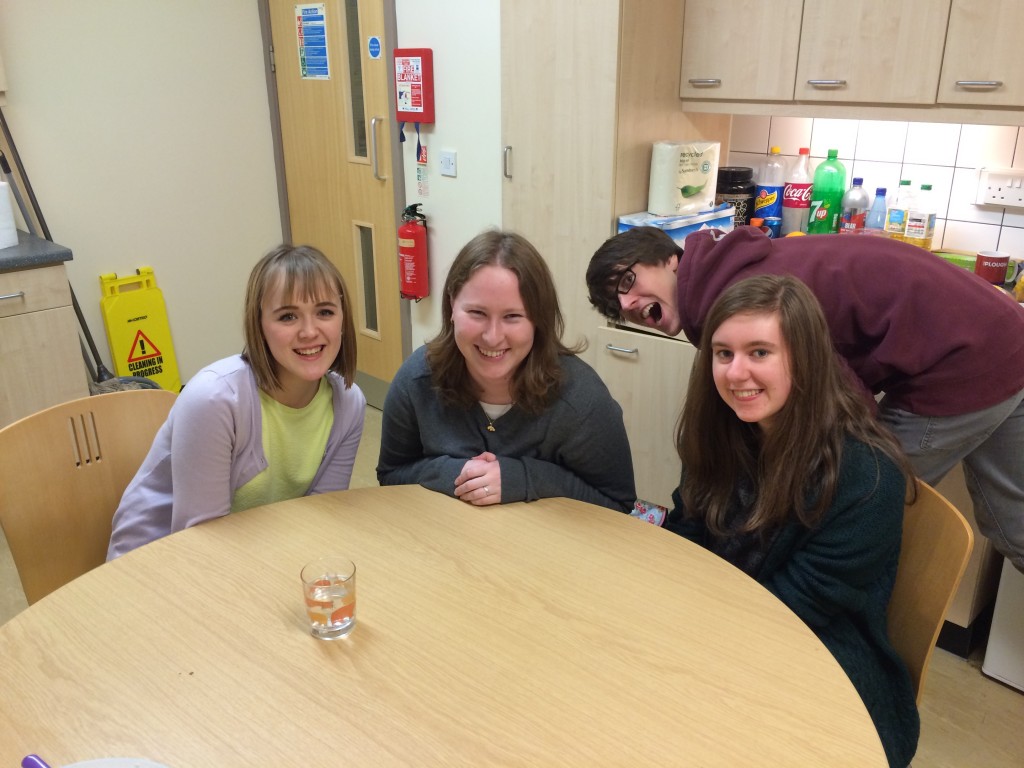I’ve been in England just over a week, and while the world may say America and England both speak English, I have encountered several word discrepancies, and not just the commonly known “chips” = “french fries” and “crisps” = “chips.” No, there are so many more differences. For example, just like how in the US, some people say “supper” rather than “dinner” for the final meal of the day, people in England sometimes use “tea” rather than “dinner” as the final meal.
So when two of my English flatmates, Elise and Katherine, asked me what I was eating for “tea,” I looked down at my Gü soufflé pud, back up at them, and tried not to be an ignorant American by saying, “I’m not having tea.”
“For what?” I asked instead.
“For tea.” Pause. “For dinner,” Katherine clarified.

I laughed before launching into a description of my newly discovered favorite food: Gü puds. While the brand does not exist in the US, I’m sure something similar has to be sold somewhere in the country. They look like pudding cups, but in glass jars. You place them in the oven for roughly ten minutes, and what comes out looks and tastes like a gourmet dessert from a five-star restaurant. So far, I’ve tried chocolate soufflé and chocolate lava cake.
As I dug into my soufflé—all light and gooey—Katherine and Elise sat next to me at the little round table in the kitchen of our flat. There are seven of us total in the flat, which honestly looks more like the floor of a dorm rather than an apartment (except for the kitchen). The word jumble of tea versus dinner still fresh in my head, I looked at Elise. “What are some common stereotypes most English people have of Americans?” I tried to sound positive and carefree. I wanted her to be honest.
She looked at Katherine and then up at the ceiling, deep in thought. “Bigger portions.”
I laughed and nodded. “That’s true for the most part.”
“Also, very patriotic.”
“Also true.”
“And humor.”
I hesitated. “Humor? What do you mean?” I expected her to say that American humor was more vulgar, which I would have been inclined to agree with as well.
“It’s hard to explain.” Elise turned to Katherine for help. “Do you know what I mean?”
“Yeah, it’s like American comedians want to raise themselves up, talking about the people who are best at things and making themselves look really smart. And British comedians lower themselves and talk about the people who are worst at things. They try to make themselves look stupid. Does that make sense?”
I nodded. “Kinda.” I’d never really thought about that, to be honest.
“Is it true British people have a stereotype of bad teeth?” Elise asked.
“Yes,” I replied immediately. I didn’t tell her my mother had warned me before I left to wear my retainer while abroad, because “I didn’t want to turn into one of those British people with horrible teeth.”
“See, and I can’t understand that!” Katherine said. “It’s not like we don’t have dentists!”
“Well, if it makes you feel any better,” I offered, “you two have great teeth.”
We all laughed. “But what are some more stereotypes of British people?” Elise asked eagerly.
“That y’all drink lots of tea.”
The girls looked down at the mugs in their hands and gave me sheepish smiles, silently conceding that point. “What else?”
“Well, that you’re all super serious.”
“What?!” they both shrieked.
“I think y’all just disproved that stereotype.”
“But why do Americans think that?” Katherine asked. I told her I honestly didn’t know.
“It’s those bloody Posh Southerners,” Elise added. “They get into all the films and everyone thinks the rest of England is like them.”
Our conversation shifted from stereotypes to accents, and we alternated explaining the different accents of our respective countries. While Elise refused to demonstrate a New York accent for me, I gave Posh Southern British my best shot. They laughed at my “y’all” usage and I pointed out the frustrating discontinuity of “tea” meaning tea, and “tea” meaning dinner.

Maybe there is some truth to stereotypes, but so far, living in England has shown me three things: one, that stereotypes fail to grasp the whole picture; two, that there’s a lot my flatmates and I can learn from each other; and three, that I will be filling my suitcase with Gü puds to bring back home.